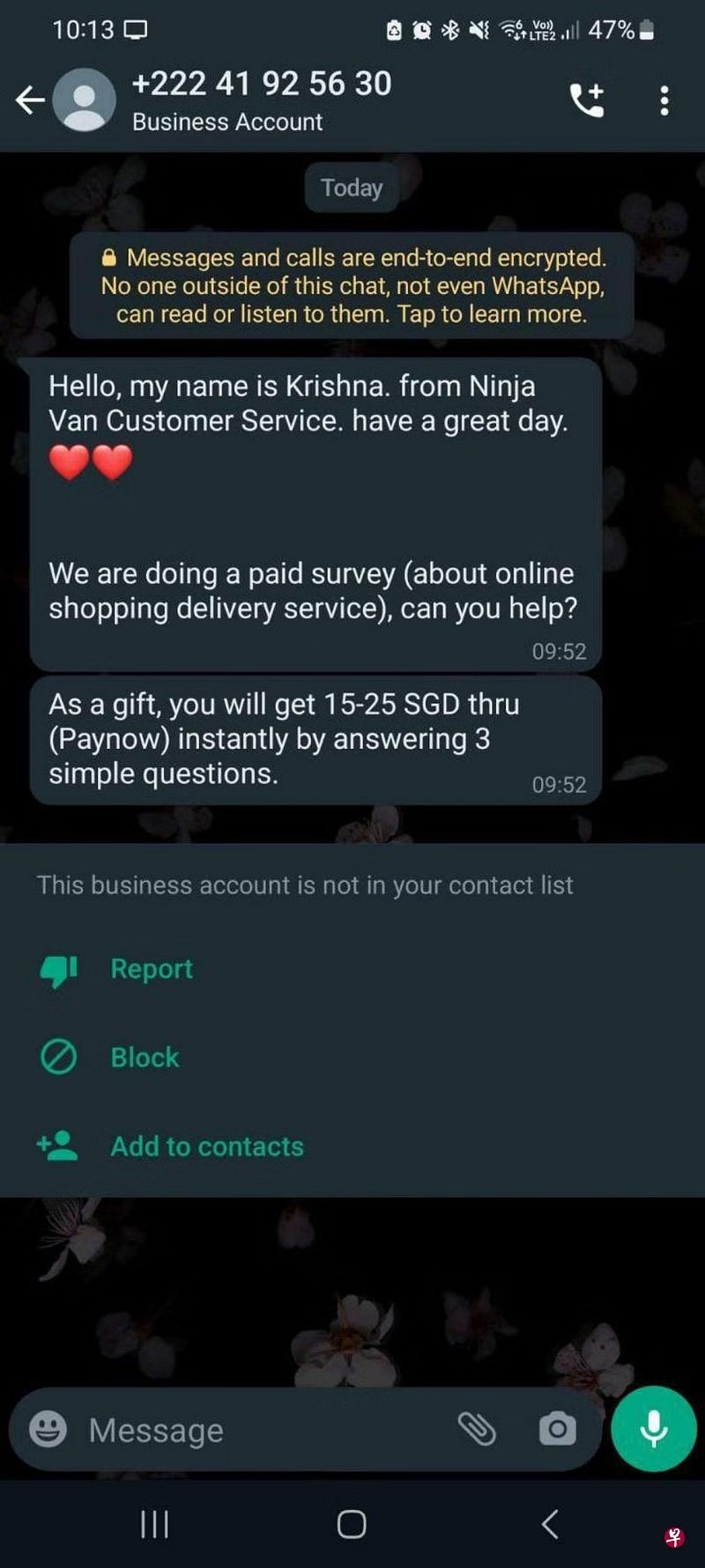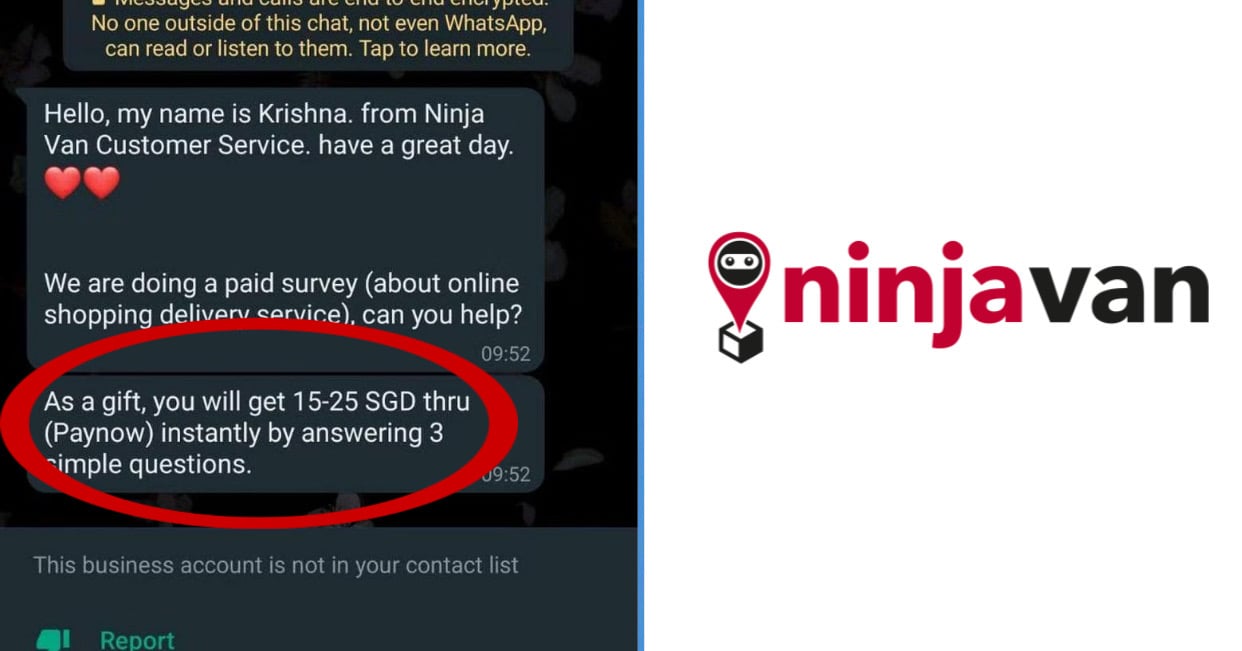Everyone knows that ninjas are masters of stealth. In that case, scammers are akin to the ninjas of our age.
Scammers are constantly devising new ways to take your hard-earned moolah covertly. This time, they’re masquerading as representatives from legitimate companies like Ninja Van to offer “paid surveys” online.
Guess the scammers are coming for the ninja brand.
Scammers Pretending to be from Legit Companies to Offer “Paid Survey” via WhatsApp
On Monday (19 June), the courier company Ninja Van issued a statement about the newest scam they’ve been unknowingly and unwillingly embroiled in.
Scammers have been pretending to be Ninja Van employees and offering “paid” surveys via WhatsApp to acquire unsuspecting individuals’ personal information.
You know you’re successful if scammers are trying to impersonate you.
How the scam works is this: A scammer will message you on WhatsApp, claiming to be from a legitimate company. They’ll offer you quick cash in exchange for filling up a survey.
Then you’ll wake up broke the next day.
Let’s look at how an instance of such a scam reported to Ninja Van played out.

Looks pretty legit.
According to Ninja Van, a scammer claiming to be from the courier company’s customer service department messaged a member of the public via WhatsApp on 6 June.
The scammer, claiming to be named “Krishna”, offered the individual $15 to $25 as a cash reward for filling up a survey with three questions.
Easier money than OnlyFans.
Upon completing the survey, the individual contacted another alleged Ninja Van employee via Telegram under Krishna’s instructions.
On Telegram, Krishna’s kaki asked the individual for a mobile number they could PayNow the $15 cash reward to and urged the individual to join a Telegram group to participate in other “paid” surveys.
At this point, the individual realised something was wrong and decided to cease contact with the scammers.
Yeah, duh. Money doesn’t come this easy.
On Wednesday (14 June), with the real Ninja Van’s assistance, the individual lodged a police report.
Crisis averted.
This isn’t the first time we’re seeing such WhatsApp scams whereby scammers offer “paid” surveys while claiming to represent legitimate organisations.
In Singapore, we don’t have the four seasons, but we do have different “identity seasons” for scammers.
In April, before these scammers’ “Ninja Van” season, they ran the same scam while alleging to be officers from the Consumers Association of Singapore (Case).
However, the reward back then was lower: $13.
Bo hua lah.
Not the First Time Scammers Have Exploited Ninja Van’s Name
If you regularly shop online, you’ve probably encountered at least one scam whereby scammers have exploited Ninja Van’s name.
Aside from the survey scam, there’s also the fake Ninja Van Mall website scam. Two websites, ninjavanmall.com and ninjavanshopping.com, surfaced and claimed to be associated with Ninja Van, prompting shoppers to purchase from the websites.
No prizes for guessing rightly—both websites are fake and not affiliated with Ninja Van.
Ninja Van isn’t like Shopee or Taobao lah. All the company does is provide supply chain and logistics services. They do not sell products directly.
If you’ve ever received a parcel for something you did not order and had to pay cash on delivery, that’s probably a Cash on Delivery (COD) scam.
In a COD scam, scammers usually send parcels to random customers via courier companies like Ninja Van to trick victims into paying for something they did not order.
We’ll give credit where it’s due: these scammers are creative.
Ninja Van has since urged the public to remain vigilant against such scams.
The first rule of thumb: Don’t respond to unfamiliar text messages, and don’t click on links provided in such messages lest you fall for a phishing trap.
Essentially, don’t talk to strangers lah.
Ninja Van emphasised that the company does not send surveys via WhatsApp. The company only uses its official e-mail address, which ends with @ninjavan.co, or its chat platform NinjaChat, to survey customers.
When in doubt, follow the “ACT” prevention steps—”Add” the ScamShield app on your phone, “Check” for legitimacy, and “Tell” someone if you’re concerned you may be embroiled in a scam.
You can read more about the “ACT” prevention steps here.
Do you think you may have encountered a scam? For assistance, you can call the Anti-Scam Helpline at 1800-722-6688 or visit the ScamAlert website to learn more about the latest scams.
